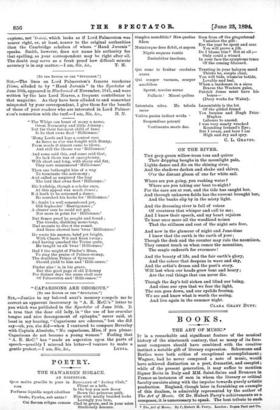[TO TEE EDITOR OF TEE 'SPECTATOR.']
Szn,—The lines on Lord Palmerston's famous racehorse _Moue, alluded to by "Hand Juvenis " in the Spectator of June 16th, appeared in Blackwood of November, 1841, and were written by the late Lord Neaves, a frequent contributor to that magazine. As they have been alluded to and somewhat misquoted by your correspondent, I give them for the benefit of those of your readers who are interested in Lord Palmer- son's connection with the turf.—I am, Sir, &c., H. N.
The Whigs can boast of many a name, Great Normanby and little Johnny ; But far their foremost child of fame Is he that owns fleet Hillionnee.'
'Hong Lords and legs a contest rose As fierce as e'er was fought with Bonny, From words it almost came to blows, And still the theme was Hillionnee.'
And some said this, and some said that,
No lack there was of caco-phonny, With short and long, with sharp and flat, They sore misnomered 'Hillionnee.'
Then one bethought him of a way To terminate the acri-mony ; And called as umpireof the fray The lord that owns fleet • Hillionnee?
His lordship, though a scholar once, At this appeal was much etonse ; B it loath to be esteemed a dunce,
He searched his books for No doubt 1 e well remembered yet, Old Sophocles" Hantigonnee ; ' A clearer case he could not get, Nor more in point for • Hillionnee.'
But firmer proof he sought and found ; The Greeks, disliking mono-tony, Had accents to direct the sound, And these showed here 'twas Hillionnee.'
He wrote his answer, brief yet bright, With Classic Wit and Keen i-rony; And having quashed the Tories quite, He taught us all 'twas Hillionnee.'
Had I the might of Pindar's Muse, To sing the praise of Palmer-stormy, The deathless Prince of Syracuse Should yield to him and `Hilli-onnee.'
Pindar alas ! is in his grave, But this good page of old E-bonny For distant days the name shall save Of Palmerston and Hilli-onnee.' "


































 Previous page
Previous page